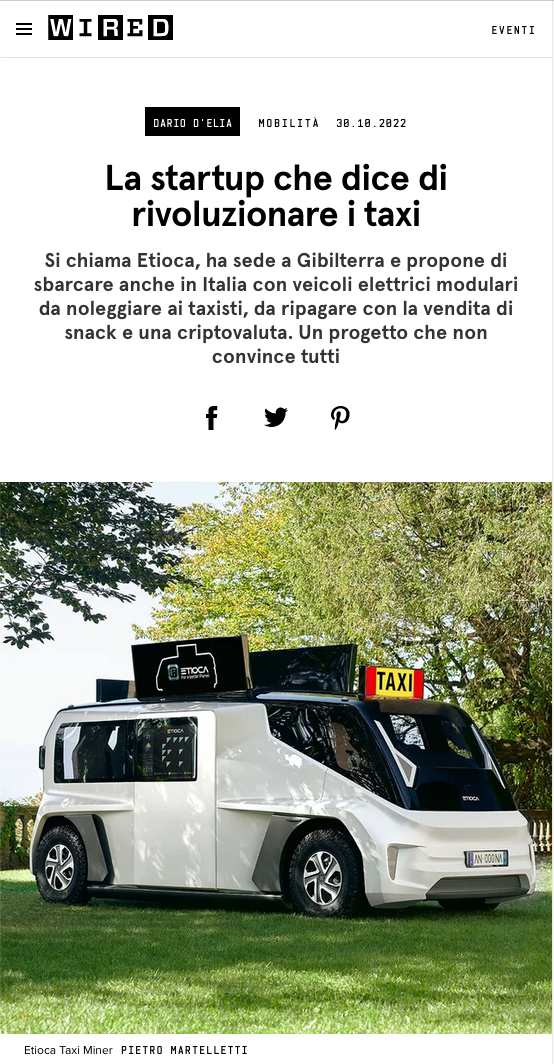Wired - The startup Etioca
The startup that claims to revolutionize taxis
It’s called Etioca, it’s based in Gibraltar and proposes to land in Italy with modular electric vehicles to rent to taxi drivers, to be repaid with the sale of snacks and a cryptocurrency. A project that does not convince everyone.
The Etioca startup, to aspire to revolutionize the taxi sector, must have really started from a blank sheet of paper because against the light there is no trace of dust or position-based integralism. “I assure you that when we talked about it to the trade associations they showed sincere interest, although they are accused of being a bit behind” Roberto Fiorello, co-managing director of the Etioca Gibraltar, told Wired.
The Israeli founder and CEO Mark Ishakov has begun to imagine since 2015 a real ecosystem based on electric vehicles equipped with multiple services, and different sources of income that ensure their sustainability. Why limit yourself to just running customers, when there is a corollary of opportunities to exploit? For now, the challenge is launched to the whole world, including Italy. Within two years we will understand who will decide to welcome it.
Etioca Taxi Miner
On 29 September the startup unveiled its first prototype of the electric vehicle called Taxi Miner in Milan. It was developed and built by the historic Turin bodyshop Coggiola, recently acquired by the same company also to obtain the WMI (Worldwide manufacturers identifier) license, which allows the unlimited production of a wide range of vehicles such as cars, trucks, buses and motorcycles. . Miner is a large multiservice electric taxi, but in any case under five meters in length, with seven modular seats “plus one for disabled passengers who can board without assistance, by means of an automatic lifting platform”. If you want, there is a way to even enter with a stroller without disassembling it or to place oversized objects such as bicycles or skis outside.
The electric motor relies on an interchangeable battery pack with approximately 350 kilometers of autonomy. The prospect is to be able to proceed with the automated (and robotic) replacement by positioning the vehicle inside special “semitrailers” strategically located on the urban or extra-urban territory. The procedure should finish in about three minutes. Similarly, cleaning and maintenance semi-trailers have been planned. “We have calculated that in one day a taxi driver travels on average about 220 kilometers a day, but above 350 kilometers you can still rely on battery swapping”, explains Fiorello.
At the moment it has not yet been decided where to establish the production of the vehicles: Italy is at stake but also other European countries. “During the presentation there was some speculation, but we have not yet decided the place and we are also awaiting the formation of the new government to activate a dialogue on the matter. For the battery gigafactory, on the other hand, we received a proposal from Lithuania and there are options in Spain and Morocco”, points out the manager.
As far as design and production are concerned, an agreement has been signed with Giugiaro: he will have the responsibility of guiding development by creating a specific center. “I joined the project that I believe to be extraordinary and revolutionary, already in ‘76 I tackled the theme of a new taxi for New York that remained in the prototype phase. I am happy with Fabrizio to contribute today to the development of this concept integrated into a global ecosystem”, commented Giorgetto Giugiaro during the presentation. And his son Fabrizio added: “We contribute to the ecosystem by bringing our experience in product development starting from the current concept on the ‘Anna’ platform that will see us engaged in designing cutting-edge vehicle types”. Anna is in fact a platform based on a modular architecture that will allow different vehicle configurations. Not only taxis but in the future also work vehicles, school shuttle, emergency vehicles, security (firefighters and police) and means of defense. In summary, Etioca focuses on the creation of an industrial center based on different locations and foresees a pilot plant (decided in the coming months), an assembly plant, a no production plant and indeed a gigafactory around which the suppliers’ plants will also be built.
The business model
When Jeremy Rifkin wrote in 2000 about the era of access as a substitute model for possession, he wasn’t kidding. Today you can experience it with streaming services and tomorrow - Etioca hopes - even the world of taxi drivers. Yes, because the proposal is to provide the rental vehicle: any licensed taxi driver (but not those who carry out a rental service with driver) will be able to pay a Taxi Miner and the combined services around 0.99 euros per kilometer. It is a European average, but it is not excluded that the rate may differ depending on the country. Hypothetically, in a day of 150 kilometers of racing the cost would be around 148 euros and multiplied by about twenty working days would reach just under 3 thousand euros.
The service will be linked to local rates, with the difference that the business model provides the opportunity through the app to pick up other passengers during the ride as in car-sharing. Current regulations do not prohibit it. Imagining a destination such as the airport, in practice more people could share the same journey, reducing the costs of the journey.
Secondly, Taxi Miner was designed to host internal and external LED displays to be dedicated to dynamic advertising campaigns and public information services. Thus a part of the revenues will be destined to the taxi driver and thanks to geolocation great flexibility will be ensured for advertisers. For some merchants it may be strategic to advertise in neighboring neighborhoods, while a specific brand may have greater appeal in one area rather than another. In Italy, regulations are still a bit patchy, with Milan and Rome at the forefront and other municipalities still in limbo between allowing or not dynamic (more profitable) video campaigns or fixed screens.
“We started as suppliers and then we fell in love with the project and without even realizing we became a partner of Etioca. The agency will plan advertising campaigns and global communication activities as well as relations with the media and institutions”, underlines Marco Molineri , CEO and co-founder of the Turin public relations agency Between. It is also planned to sell some goods directly in the vehicles, such as soft drinks or snacks. And on the basis of a license obtained in Gibraltar, Etioca plans to develop a token that converts the kilometers traveled by taxi drivers into carbon credits using energy from renewable sources. According to Fiorello, this operation should allow taxi drivers to be awarded an additional bonus.
The first deliveries in 2024
Etioca has scheduled the first deliveries for the second half of 2024: a batch of 10,000 vehicles destined for Latvia and Israel. Then the plans foresee a production of 45 thousand units in 2025 and to reach 100 thousand in 2027. The initial estimated investment is 400 million dollars, while within three years it should reach 1.2 billion. Investors have not been disclosed, but the presence of Etioca in Gibraltar’s three-year economic plan has been made official and there is also the involvement of the Spanish government. “The pre-order form is available on the site. Taxi drivers can register with a transaction of 100 euros. This amount allows you to manage the feasibility of the order and will be returned to future drivers on the Etioca debit card, on the same day of delivery of the vehicle starting from 2024”, concludes the company. In practice, the app and the company credit card are functional to the management of credits and debits.
The doubts of some Italian taxi drivers
Etioca’s business model could also be applied in Italy but according to some taxi drivers we interviewed there are several critical issues. The first is that on average taxi drivers buy cars in a much lower price range: we are talking about a maximum of 20/30 thousand considering also the discounts. Consequently, even any financing or leasing has much lower installments than the 3 thousand euros of costs that Taxi Miner could provide - however excluding private use. Etioca speculates that the expense can be amply amortized with the expected income, but long-time taxi drivers argue that perhaps it is not worth working more just to meet more expenses.









